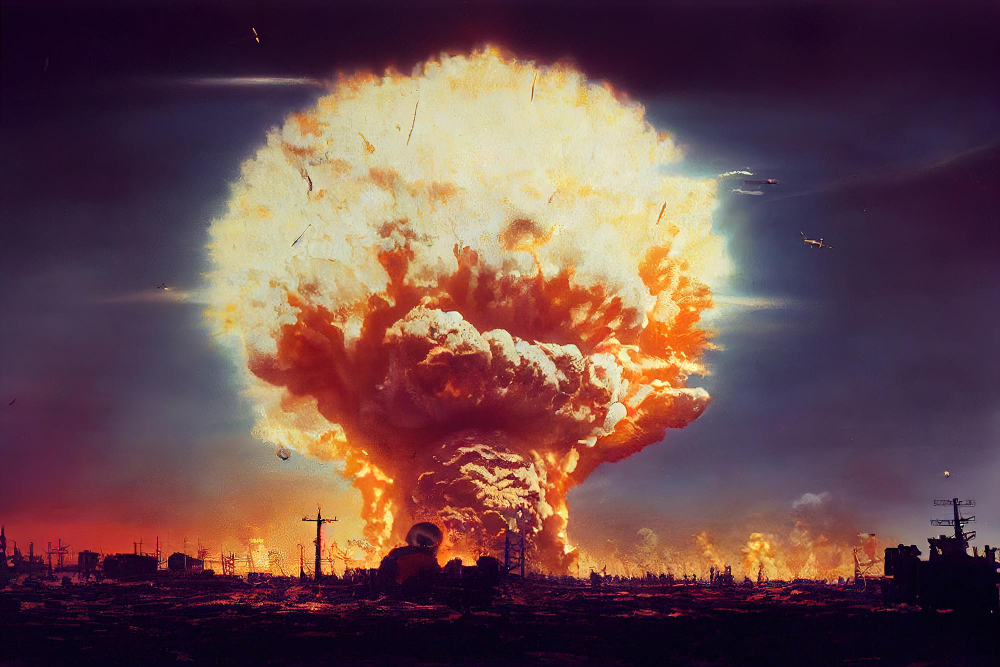Original article (in Serbian) was published on 24/03/2023
The British government has announced that it will send ammunition containing depleted uranium to the Ukrainian army. Although it is conventional ammunition, Putin incorrectly stated that the West is using “nuclear components” and warned that they will respond in the same manner. Both sides started the war with announcements, and Informer chose the side they liked better – Russia – and followed the whole case using a manipulative headline “The British will cause a NUCLEAR WAR”.
Informer used the claims of Russian officials for its sensational headline in yesterday’s edition. In the text, they state that the Russians announce that, if London sends grenades with depleted uranium, they will surely respond in the same manner – with nuclear-charged weapons.
However, this, in relation to depleted uranium ammunition is not a nuclear weapon, as the British authorities clarified, but Informer did not convey it.
What is it about?
On March 20, the Minister of Defense of Great Britain confirmed that this country will send “Challenger 2” battle tanks as part of military aid to Ukraine, as well as ammunition containing depleted uranium, which, as stated on the website of the British Parliament, is “very effective in penetrating modern tanks and armoured vehicles”.
Commenting on these announcements, Russian President Vladimir Putin warned that Russia will react if these weapons are delivered to Ukraine, because, according to him, they contain a “nuclear component”.
“I would like to note that if this happens, Russia will have to respond accordingly. I think that the collective West has already started using weapons with nuclear components”, the Kremlin statement said.
Informer conveyed the reactions one-sidedly – there was room for the comments of Russian ministers Sergey Lavrov and Sergey Shoigu, who believe that the British decision undermines global stability.
However, it remained silent that the British Ministry of Defense denied Putin’s claims, saying that “the British army has been using depleted uranium in armour-piercing shells for decades”.
“It is a common component and has nothing to do with nuclear weapons or capabilities. Russia knows this, but it is deliberately spreading disinformation”, said the spokesman of the British Ministry of Defense, reports CNN.
Depleted uranium, as stated on the website of the International Coalition for the Prohibition of Uranium Weapons, is a conventional, not a nuclear, weapon.
According to their data, it is produced by the USA, Great Britain, Russia, China and Pakistan, and 14 other countries store it.
It was used during the Gulf War and the NATO bombing of Yugoslavia.
What is depleted uranium?
Depleted uranium is produced from natural uranium and, according to the International Atomic Energy Agency, has a lower level of radioactivity than natural uranium.
Due to its physical and chemical characteristics, depleted uranium is used in the military industry, primarily in the production of missiles and ammunition intended to penetrate tanks and other similar armour. It can also be a component of the tank armour itself, since it is significantly more resistant to ammunition than conventional steel armour, according to this agency.
The American New York Times, which also dealt with this current topic, states that “depleted uranium is a standard component of anti-armour weapons that NATO members have been using for decades”.
“Due to its density, depleted uranium is effective for penetrating heavy armour on the battlefield and is also used by other armies. Among them is the Russian one, which has upgraded its battle tank by adding the ability to fire shells with depleted uranium, which the Russian agency Tass wrote about in 2018”, according to the New York Times.
For years, there have been numerous controversies and uncertainties regarding the impact that weapons with depleted uranium can have on health and the environment.
According to the International Atomic Energy Agency, studies conducted on Gulf War veterans have shown that exposure to depleted uranium has not had any effects on their health so far.
However, the Agency points out that exposure to radiation emitted by depleted uranium can cause cancer, as is the case with all other radioactive elements.
“It is assumed that this risk is proportional to the received dose”, the Agency states.
The International Coalition for the Prohibition of Uranium Weapons states that when bullets with depleted uranium hit the surface, they create radioactive and toxic dust that humans absorb through food and breathing and that can cause various diseases.
On the other hand, the Royal Society (Academy of Sciences of the United Kingdom) claimed in their 2002 reports that “the risks to the kidneys and other organs and tissues from the use of depleted uranium in ammunition are very small for most soldiers on the battlefield and for those living in the conflict zone”. In some extreme cases of extreme exposure to depleted uranium, they said, there would be a danger to the kidneys and lungs.
Reuters cites a United Nations report on the impact of depleted uranium in Serbia and Montenegro from 2002, which states that “no alarming levels of depleted uranium contamination have been detected”. This news agency, however, reminds that “Serbian politicians dispute this and attribute the increase in malignant diseases to the consequences of NATO bombing”.
The World Health Organization also stated in its reports, based on research, that depleted uranium can be toxic and dangerous. As stated in one of the reports, it primarily affects the lungs and kidneys, but how much damage it will cause depends on the degree and length of human exposure.
The body does not absorb it to the greatest extent but throws it out through urine and faeces. Nevertheless, inhaled particles with a size of one to 10 micrometres remain in the lungs, and can, as stated by the WHO, cause lung damage, as well as cancer “if their presence causes a sufficiently high dose of radiation over a prolonged period”.

